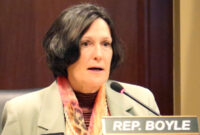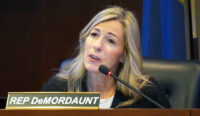The House Education Committee advanced a bill Thursday to create a new administrators certificate, which could allow people with no education experience to lead a charter school.
Pushed by Rep. Judy Boyle, R-Midvale and Sen. Lori Den Hartog, R-Meridian, Senate Bill 1058 would create a new charter school administrators certificate as an alternative to a traditional certificate.

Boyle and other supporters said the bill is necessary to give charter schools the flexibility to hire the administrator of their choice.
Opponents say the bill would set standards for charter school administrators and create situations where people with no education experience would oversee teacher evaluations and curriculum development.
House Education passed the bill over opposition from the State Board of Education, the Idaho Public Charter School Commission, the Idaho Association of School Administrators and the Idaho Education Association.
Committee members also voted down a motion to hold the bill until Tuesday so legislators could review a legal analysis from the attorney general’s office.
“It remains unclear how a charter school administrator may assess a certified educator when that administrator is not certified,” Assistant Chief Deputy Attorney General Brian Kane wrote in the Feb. 25 analysis, a copy of which was shared with Idaho Education News after Thursday’s meeting.
If the bill is passes, individuals would be able to obtain a new charter school administrator’s certificate if they:
- Hold a bachelor’s degree.
- Pass a criminal background check.
- Complete three semester credits of training on teacher evaluations.
- Demonstrate that a charter school board of directors is seeking to hire them and oversee them.
- Have a minimum amount of professional experience in the business, military or education sectors.
In contrast, under the current administrator requirements, a principal must hold a master’s degree, while a superintendent must hold an education specialist degree, a doctorate degree or complete a comparable post-master’s sixth-year program, according to the attorney general’s analysis.
Boyle said the bill does not lower standards, as some opponents suggested in testimony. Instead, she said it simply gives charter boards flexibility to hire an innovative leader who would still be accountable to the board.
The attorney general’s analysis took a different approach.
“The requirements for a charter school administrator certificate are not as rigorous as those for a public school administrator,” Kane wrote. “The public school administrator certificate is a higher standard.”
SB 1058 next heads to the House floor with a recommendation it passes. It already passed the Senate 21-12 on Monday. Last year, on the final day of the legislative session, then-Gov. Butch Otter vetoed a similar bill.
Funding formula discussion delayed
House Education was scheduled to participate in another discussion on the public school funding formula Thursday morning.
However, the discussion was put on hold because the debate over SB 1058 ran long and legislators needed to attend the House’s morning floor session.
It’s not immediately clear what postponing the discussion means for the funding formula.
During Wednesday’s discussion of the proposal, Rep. Gary Marshall, R-Idaho Falls, said he was so out of the loop in discussions over developing a funding formula bill that “I’m not sure how we even move forward at this point.”
House Education Chairman Lance Clow, R-Twin Falls, told Idaho EdNews on Wednesday that a bill could be ready for introduction as early as Friday. However, he said the drafting process and ongoing discussions could push the introduction back to next week.
Friday’s committee agenda makes no reference to the funding formula.
If and when a funding formula bill is officially introduced, it would become a top education issue this year. But legislative leaders, who scheduled morning and afternoon floor sessions on Tuesday and Thursday, appear to be working toward adjourning the session in late March. That could create a tight timeline for a proposal that does not yet appear to enjoy universal support.
Nontraditional teacher program bill advances
In other action Thursday, the House passed a bill to allow nontraditional teacher education programs to request state funding.

Pushed by Rep. Gayann DeMordaunt, R-Eagle, House Bill 93 passed by a 43-25 margin.
If passed, the bill would allow state-approved nontraditional teacher programs to enter into contracts with school districts or charters to recruit and train teachers.
Those nontraditional programs would then be able to apply for state funding, so long as they matched any state contributions by at least 100 percent. Such programs would also need to demonstrate their teachers achieve above-average academic growth among students.
Currently, two such programs would qualify for the partnerships and funding assistance outlined in the bill — Teach for America and ABCTE, although other programs could apply for approval.
DeMordaunt said the bill would represent a valuable new tool to help combat Idaho’s teacher turnover and attrition issues.
“It addresses what is an irrefutable and increasingly critical challenge in the state of Idaho in terms of educating our K-12 students and the teacher pipeline problem,” DeMordaunt said.
DeMordaunt cited a State Board of Education report that shows Idaho’s rate of teacher turnover exceeds national averages.
There was very little debate over the bill, but Rep. Paul Amador, R-Coeur d’Alene, voted against it after saying he was concerned about the costs and turnover rates within TFA.
HB 93 next heads to the Senate, where it will likely be assigned to the Senate Education Committee.
